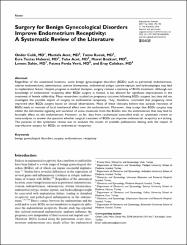| dc.contributor.author | Çelik, Önder | |
| dc.contributor.author | Acet, Mustafa | |
| dc.contributor.author | Küçük, Tansu | |
| dc.contributor.author | Tuştaş Haberal, Esra | |
| dc.contributor.author | Acet, Tuba | |
| dc.contributor.author | Bozkurt, Murat | |
| dc.contributor.author | Şahin, Levent | |
| dc.contributor.author | Verit, Fatma Ferda | |
| dc.contributor.author | Çalışkan, Eray | |
| dc.date.accessioned | 10.07.201910:49:13 | |
| dc.date.accessioned | 2019-07-10T20:02:51Z | |
| dc.date.available | 10.07.201910:49:13 | |
| dc.date.available | 2019-07-10T20:02:51Z | |
| dc.date.issued | 2017 | en_US |
| dc.identifier.citation | Çelik, Ö., Acet, M., Küçük, T., Tuştaş Haberal, E., Acet, T., Bozkurt, M. ... Çalışkan, E. (2017). Surgery for benign gynecological disorders improve endometrium receptivity: A systematic review of the literature. Reproductive Sciences, 24(2), 174-192. https://dx.doi.org/10.1177/1933719116654993 | en_US |
| dc.identifier.issn | 1933-7191 | |
| dc.identifier.issn | 1933-7205 | |
| dc.identifier.uri | https://dx.doi.org/10.1177/1933719116654993 | |
| dc.identifier.uri | https://hdl.handle.net/20.500.12511/3750 | |
| dc.description | WOS: 000394802500002 | en_US |
| dc.description | PubMed ID: 27485359 | en_US |
| dc.description.abstract | Regardless of the anatomical locations, some benign gynecological disorders (BGDs) such as peritoneal endometriosis, ovarian endometrioma, adenomyosis, uterine leiomyomas, endometrial polyps, uterine septum, and hydrosalpinges may lead to implantation failure. Despite progress in medical therapies, surgery remains a mainstay of BGDs treatment. Although our knowledge of endometrial receptivity after BGDs surgery is limited, it has allowed for significant improvement in the treatment of female subfertility. Many researchers studied on pregnancy outcome following BGDs surgery, but they did not investigate the possible impact of surgery on endometrial receptivity. They, therefore, concluded that pregnancy rates improved after BGDs surgery based on clinical observations. Many of these clinicians believe that surgical resection of BGDs leads to removal of local mechanical effect over the endometrium. Moreover, they accept that BGDs surgery may inhibit the detrimental signaling and secretion of some molecules from the BGDSs into the endometrium that may lead to favorable effect on the endometrium. However, so far, data from randomized controlled trials or systematic review or meta-analyses to answer the question whether surgical treatment of BGDs can improve endometrial receptivity are lacking. The purpose of this systematic review was to evaluate the results of available publications dealing with the impact of reproductive surgery for BGDs on endometrial receptivity. | en_US |
| dc.language.iso | eng | en_US |
| dc.publisher | Sage Publications Inc | en_US |
| dc.rights | info:eu-repo/semantics/openAccess | en_US |
| dc.subject | Benign Gynecological Disorders | en_US |
| dc.subject | Surgery | en_US |
| dc.subject | Endometrium | en_US |
| dc.subject | Receptivity | en_US |
| dc.title | Surgery for benign gynecological disorders improve endometrium receptivity: A systematic review of the literature | en_US |
| dc.type | review | en_US |
| dc.relation.ispartof | Reproductive Sciences | en_US |
| dc.department | İstanbul Medipol Üniversitesi, Tıp Fakültesi, Cerrahi Tıp Bilimleri Bölümü, Kadın Hastalıkları ve Doğum Ana Bilim Dalı | en_US |
| dc.identifier.volume | 24 | en_US |
| dc.identifier.issue | 2 | en_US |
| dc.identifier.startpage | 174 | en_US |
| dc.identifier.endpage | 192 | en_US |
| dc.relation.publicationcategory | Diğer | en_US |
| dc.identifier.doi | 10.1177/1933719116654993 | en_US |
| dc.identifier.wosquality | Q2 | en_US |
| dc.identifier.scopusquality | Q1 | en_US |


















